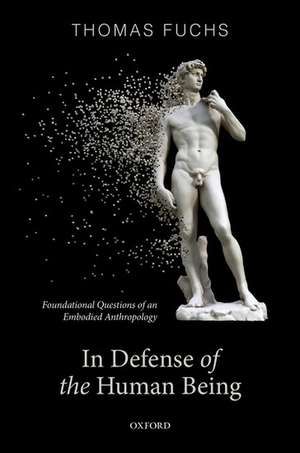In Defence of the Human Being: Foundational Questions of an Embodied Anthropology
Autor Thomas Fuchsen Limba Engleză Hardback – 23 sep 2021
Preț: 296.66 lei
Preț vechi: 359.25 lei
-17% Nou
Puncte Express: 445
Preț estimativ în valută:
56.77€ • 59.05$ • 46.87£
56.77€ • 59.05$ • 46.87£
Carte tipărită la comandă
Livrare economică 03-09 aprilie
Livrare express 08-14 martie pentru 101.35 lei
Preluare comenzi: 021 569.72.76
Specificații
ISBN-13: 9780192898197
ISBN-10: 0192898191
Pagini: 272
Dimensiuni: 162 x 240 x 22 mm
Greutate: 0.61 kg
Editura: OUP OXFORD
Colecția OUP Oxford
Locul publicării:Oxford, United Kingdom
ISBN-10: 0192898191
Pagini: 272
Dimensiuni: 162 x 240 x 22 mm
Greutate: 0.61 kg
Editura: OUP OXFORD
Colecția OUP Oxford
Locul publicării:Oxford, United Kingdom
Recenzii
Thomas Fuchs' book, implicitly arguing for the necessity of vulnerability, persuades the reader to re-shape the definition of major categories -such as subjectivity, health, and wellbeing and to find, in liminality itself, the richness of our existence.
In Defense of the Human Being is a book which serves as a compass, both for philosophers, clinicians and neuroscientists. It reminds us that humans cannot be dualistically divided into two different substances, rather that they are made of flesh and blood: they experience, the feel, they think - as embodied living subjects, embedded into the world and in a reciprocal relationship with it. "Life can be known only by life", wrote Hans Jonas (Jonas, 2001); through this work, Thomas Fuchs revitalizes this lesson and drives philosophy in confrontation with the new challenges of our time.
This provocative book is to be welcomed for the lucidity, breadth and intelligence of its arguments. It will be a valuable resource for students, academics and therapists, and for anyone who has ever suspected that mainstream psychology in this country is in danger of congealing into dogma.
In Defense of the Human Being is a book which serves as a compass, both for philosophers, clinicians and neuroscientists.
In Defense of the Human Being is a book which serves as a compass, both for philosophers, clinicians and neuroscientists. It reminds us that humans cannot be dualistically divided into two different substances, rather that they are made of flesh and blood: they experience, the feel, they think - as embodied living subjects, embedded into the world and in a reciprocal relationship with it. "Life can be known only by life", wrote Hans Jonas (Jonas, 2001); through this work, Thomas Fuchs revitalizes this lesson and drives philosophy in confrontation with the new challenges of our time.
This provocative book is to be welcomed for the lucidity, breadth and intelligence of its arguments. It will be a valuable resource for students, academics and therapists, and for anyone who has ever suspected that mainstream psychology in this country is in danger of congealing into dogma.
In Defense of the Human Being is a book which serves as a compass, both for philosophers, clinicians and neuroscientists.
Notă biografică
Thomas Fuchs, MD, PhD, is Karl Jaspers Professor of Philosophy and Psychiatry at Heidelberg University, Germany. His main areas of expertise include phenomenological philosophy and psychopathology as well as embodied and enactive cognitive science, with a particular emphasis on non-representational, interactive concepts of social cognition. He was Coordinator of several large national and international grants, among them the European Research Training Network “Towards an Embodied Science of Intersubjectivity” (TESIS). He has authored over 350 journal articles, book chapters and several books. He is Editor-in-Chief of “Psychopathology” and editorial board member of 4 scientific journals.
